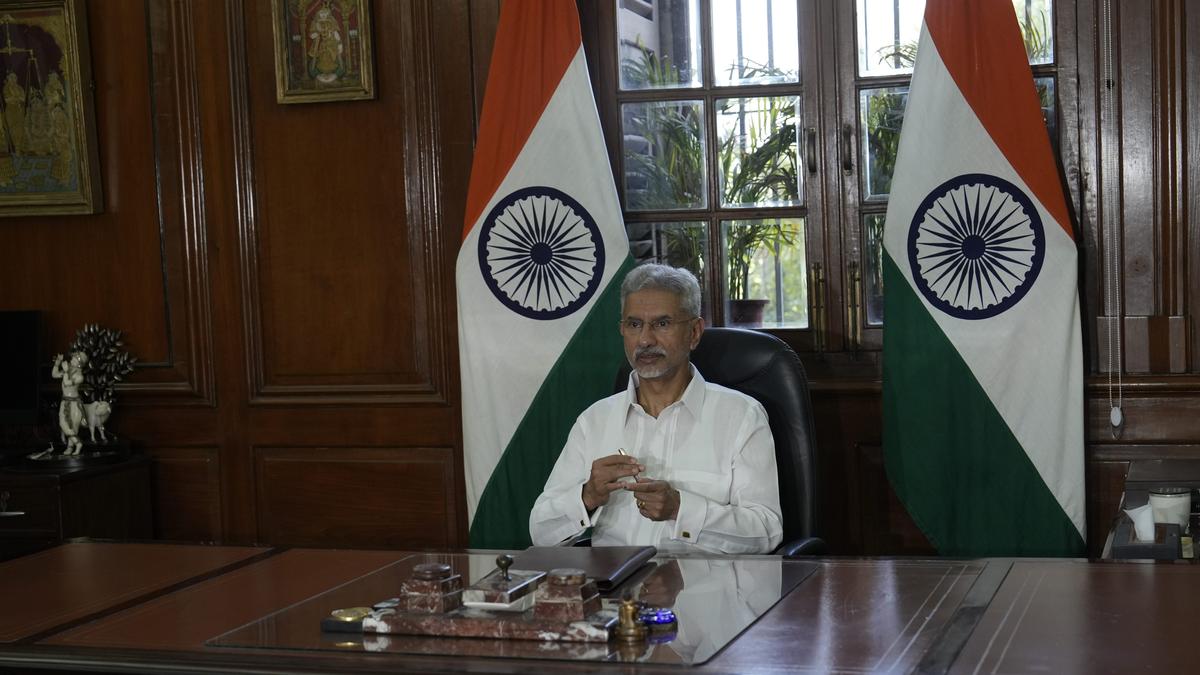
As EAM Jaishankar pads up for a second term with a new team, foreign policy challenges remain the same Premium
The Hindu
External Affairs Minister for a second term S. Jaishankar, hit the floor running, sending out a message of continuity and “business as usual” for Indian foreign policy in the new government
External Affairs Minister for a second term, S. Jaishankar hit the floor running on June 10, sending out a message of continuity and “business as usual” for Indian foreign policy in the new government. While he assumed charge as for his second consecutive term on June 11, hours before his portfolio was even formally announced, he called on all seven neighbourhood leaders who had been invited to witness PM Narendra Modi’s swearing-in ceremony. By including Maldives President Mohammad Muizzu, whose government had been at loggerheads with New Delhi until India accepted his demand to withdraw Indian troops from the southern atolls, Mr. Modi has attempted to get ahead of the first of many foreign policy challenges he will face in the neighbourhood, during his third term.
While Mr. Jaishankar has served in South Block for much of the past decade, he will have a new team. None of the Ministry of External Affairs’ (MEA) three previous MoS’s have been retained as Ministers, and the new MoSs are UP MP Kirti Vardhan Singh and Assam MP Pabitra Margherita. In addition, Foreign Secretary Vinay Kwatra’s extension ends in October, with Deputy NSA Vikram Misri widely believed to be the next in line.
Also read | From warp speed to reset, the state of India-U.S. ties
Former Foreign Secretary and Chairperson of the National Security Advisory Board Shyam Saran said that he did not anticipate “any significant departures in policy” with Mr. Jaishankar remaining at the helm of External Affairs.
“What I would hope to see is re-engagement with Pakistan and an effort to seek a new equilibrium with China. The neighbourhood has suffered relative neglect with the pursuit a high global profile. I would hope there is a re-focus on the neighbourhood which remains the most critical factor for Indian interests,” he told The Hindu when asked about the foreign policy agenda ahead. While the re-engagement with Pakistan seems difficult at present, “lower-hanging fruit” such as restoring High Commissioners, and restarting some of the cross-border trade for agricultural goods may be possible, especially if PM Modi decides to meet with Pakistan PM Shehbaz Sharif next month on the side-lines of the SCO summit in Astana, Kazakhstan.
All eyes will be on whether PM Modi and Chinese President Xi Jinping meet there in an effort to resolve the four-year old ongoing military standoff at the LAC. In an interview to Newsweek magazine in April, PM Modi called India-China ties “important and significant”, and said the standoff must be “urgently addresses” through talks, refraining from any criticism of China’s actions.
The next big item on the agenda for the government will be keeping the balance between the U.S. and Russia, the global north and the global south. In his second term, PM Modi had won accolades for navigating India to a “sweet spot” over issues like the Russia-Ukraine war, where both sides have been keen to court India’s favour. In the next few weeks, more of the balancing will be on display as PM leaves for Italy on June 13-14 to attend the G-7 outreach with western countries and is due in Astana on July 3-4, where Russian President Putin is expected to be present, and later in October to Russia for the BRICS summit.

After a long, tiring day all we want is to jump right on our cosy beds and rest comfortably on our soft, fluffy pillows, right? Pillows are not quite appreciated as much as electric cars or air-fryers, for instance. Pillows are a wonderful man-made creation that has improved the lives and sleep of people across the globe. Did you know ages ago people used to rest their heads on a HARD ROCK? So how did humans go from sleeping on stones to cosy, fluffy and soft pillows today? Let’s get into the origin of your everyday pillows!

As the November 30 deadline nears for installing vehicle location tracking devices (VLTD) and emergency panic buttons in public service and nationally permitted goods vehicles in Karnataka, transport unions representing cab, bus, and truck operators are urging the government to reconsider the mandate. They argue that the high cost of these devices and a lack of awareness have made it difficult for many vehicle owners to comply with the requirement.









